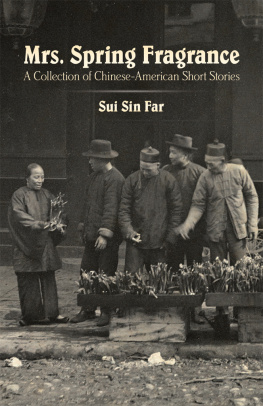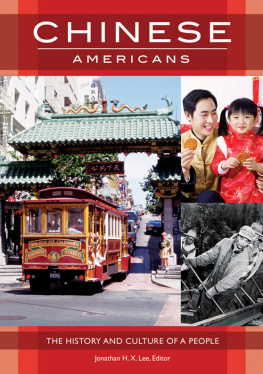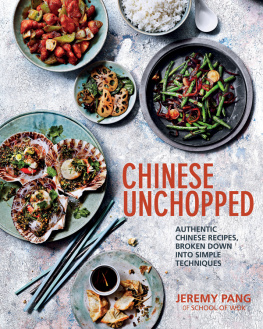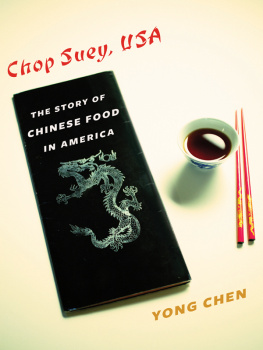Mrs. Spring Fragrance
A Collection of Chinese-American Short Stories
Sui Sin Far
DOVER PUBLICATIONS, INC.
Mineola, New York
Copyright
Copyright 2013 by Dover Publications, Inc.
All rights reserved.
Bibliographical Note
Mrs. Spring Fragrance: A Collection of Chinese-American Short Stories, first published by Dover Publications, Inc., in 2013, is a reprint of a selection of stories from the edition first published by A.C. McClurg, Chicago, in 1912.
Library of Congress Cataloging-in-Publication Data
Sui Sin Far, 18651914.
Mrs. Spring Fragrance : a Collection of Chinese-American Short Stories / Sui Sin Far.
pages cm.
Summary: One of the first works of fiction published by a Chinese-American author, this collection of 17 short stories offers a revealing look at life in San Franciscos Chinatown during the early 20th century. Deceptively simple tales of family life offer deeper reflections of the tensions that arise in the course of cultural assimilationProvided by publisher.
eISBN-13: 978-0-486-78273-7
I. Title.
PR9199.2.S93M77 2013
813'.4dc23
2013028041
Manufactured in the United States by Courier Corporation
49317201 2013
www.doverpublications.com
Contents
Mrs. Spring Fragrance
Mrs. Spring Fragrance
I
WHEN MRS. SPRING FRAGRANCE first arrived in Seattle, she was unacquainted with even one word of the American language. Five years later her husband, speaking of her, said: There are no more American words for her learning. And everyone who knew Mrs. Spring Fragrance agreed with Mr. Spring Fragrance.
Mr. Spring Fragrance, whose business name was Sing Yook, was a young curio merchant. Though conservatively Chinese in many respects, he was at the same time what is called by the Westerners, Americanized. Mrs. Spring Fragrance was even more Americanized.
Next door to the Spring Fragrances lived the Chin Yuens. Mrs. Chin Yuen was much older than Mrs. Spring Fragrance; but she had a daughter of eighteen with whom Mrs. Spring Fragrance was on terms of great friendship. The daughter was a pretty girl whose Chinese name was Mai Gwi Far (a rose) and whose American name was Laura. Nearly everybody called her Laura, even her parents and Chinese friends. Laura had a sweetheart, a youth named Kai Tzu. Kai Tzu, who was American-born, and as ruddy and stalwart as any young Westerner, was noted amongst baseball players as one of the finest pitchers on the Coast. He could also sing, Drink to me only with thine eyes, to Lauras piano accompaniment.
Now the only person who knew that Kai Tzu loved Laura and that Laura loved Kai Tzu, was Mrs. Spring Fragrance. The reason for this was that, although the Chin Yuen parents lived in a house furnished in American style, and wore American clothes, yet they religiously observed many Chinese customs, and their ideals of life were the ideals of their Chinese forefathers. Therefore, they had betrothed their daughter, Laura, at the age of fifteen, to the eldest son of the Chinese Government schoolteacher in San Francisco. The time for the consummation of the betrothal was approaching.
Laura was with Mrs. Spring Fragrance and Mrs. Spring Fragrance was trying to cheer her.
I had such a pretty walk today, said she. I crossed the banks above the beach and came back by the long road. In the green grass the daffodils were blowing, in the cottage gardens the currant bushes were flowering, and in the air was the perfume of the wallflower. I wished, Laura, that you were with me.
Laura burst into tears. That is the walk, she sobbed, Kai Tzu and I so love; but never, ah, never, can we take it together again.
Now, Little Sister, comforted Mrs. Spring Fragrance you really must not grieve like that. Is there not a beautiful American poem written by a noble American named Tennyson, which says:
Tis better to have loved and lost.
Than never to have loved at all?
Mrs. Spring Fragrance was unaware that Mr. Spring Fragrance, having returned from the city, tired with the days business, had thrown himself down on the bamboo settee on the veranda, and that although his eyes were engaged in scanning the pages of the Chinese World, his ears could not help receiving the words which were borne to him through the open window.
Tis better to have loved and lost,
Than never to have loved at all,
repeated Mr. Spring Fragrance. Not wishing to hear more of the secret talk of women, he arose and sauntered around the veranda to the other side of the house. Two pigeons circled around his head. He felt in his pocket for a li-chi which he usually carried for their pecking. His fingers touched a little box. It contained a jadestone pendant, which Mrs. Spring Fragrance had particularly admired the last time she was down town. It was the fifth anniversary of Mr. and Mrs. Spring Fragrances wedding day.
Mr. Spring Fragrance pressed the little box down into the depths of his pocket.
A young man came out of the back door of the house at Mr. Spring Fragrances left. The Chin Yuen house was at his right.
Good evening, said the young man. Good evening, returned Mr. Spring Fragrance. He stepped down from his porch and went and leaned over the railing which separated this yard from the yard in which stood the young man.
Will you please tell me, said Mr. Spring Fragrance, the meaning of two lines of an American verse which I have heard?
Certainly, returned the young man with a genial smile. He was a star student at the University of Washington, and had not the slightest doubt that he could explain the meaning of all things in the universe.
Well, said Mr. Spring Fragrance, it is this:
Tis better to have loved and lost,
Than never to have loved at all.
Ah! responded the young man with an air of profound wisdom. That, Mr. Spring Fragrance, means that it is a good thing to love anywayeven if we cant get what we love, or, as the poet tells us, lose what we love. Of course, one needs experience to feel the truth of this teaching.
The young man smiled pensively and reminiscently. More than a dozen young maidens loved and lost were passing before his minds eye.
The truth of the teaching! echoed Mr. Spring Fragrance, a little testily. There is no truth in it whatever. It is disobedient to reason. Is it not better to have what you do not love than to love what you do not have?
That depends, answered the young man, upon temperament.
I thank you. Good evening, said Mr. Spring Fragrance. He turned away to muse upon the unwisdom of the American way of looking at things.
Meanwhile, inside the house, Laura was refusing to be comforted.
Ah, no! no! cried she. If I had not gone to school with Kai Tzu, nor talked nor walked with him, nor played the accompaniments to his songs, then I might consider with complacency, or at least without horror, my approaching marriage with the son of Man You. But as it isoh, as it is !
The girl rocked herself to and fro in heartfelt grief.
Mrs. Spring Fragrance knelt down beside her, and clasping her arms around her neck, cried in sympathy:
Little Sister, oh, Little Sister! Dry your tearsdo not despair. A moon has yet to pass before the marriage can take place. Who knows what the stars may have to say to one another during its passing? A little bird has whispered to me
For a long time Mrs. Spring Fragrance talked. For a long time Laura listened. When the girl arose to go, there was a bright light in her eyes.
II
MRS. SPRING FRAGRANCE, in San Francisco on a visit to her cousin, the wife of the herb doctor of Clay Street, was having a good time. She was invited everywhere that the wife of an honorable Chinese merchant could go. There was much to see and hear, including more than a dozen babies who had been born in the families of her friends since she last visited the city of the Golden Gate. Mrs. Spring Fragrance loved babies. She had had two herself, but both had been transplanted into the spirit land before the completion of even one moon. There were also many dinners and theatre-parties given in her honor. It was at one of the theatre-parties that Mrs. Spring Fragrance met Ah Oi, a young girl who had the reputation of being the prettiest Chinese girl in San Francisco, and the naughtiest. In spite of gossip, however, Mrs. Spring Fragrance took a great fancy to Ah Oi and invited her to a tte--tte picnic on the following day. This invitation Ah Oi joyfully accepted. She was a sort of bird girl and never felt so happy as when out in the park or woods.
Next page






